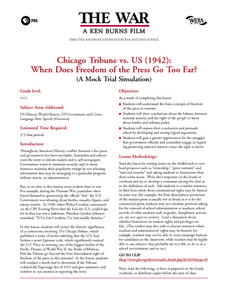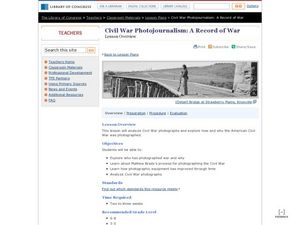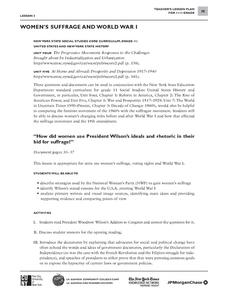Curated OER
Ny Secret War: Lesson 10
Fifth graders explore the role of propaganda during the war. In this social studies lesson, 5th graders view various forms of propaganda and design their own propaganda poster.
Curated OER
Wilson's 14 Points
Young scholars analyze political cartoons representing the role of the U.S. in the Post-World War One Era. They work in groups and analyze cartoons for their stereotypes, symbols, and caricatures. After analyzing them, they complete a...
Japan Society
Japan in the World Since 1945
What have US-Japanese relations been like since the conclusion of World War II? Why do some commentators identify Japan's postwar years as a subordinate independence? Invite your young historians to research Japan's status in the world...
Curated OER
Enemy or Ally: America's Response to the Russian Revolution
Learners examine the events related to the Russian Revolution. In groups, they use the internet to discover the concerns of Woodrow Wilson during this time period and relate them to the origins of the Cold War. To end the lesson, they...
Curated OER
On The Home Front
High schoolers write their responses to five questions about their home town. After watching an excerpt from "The War", they work together in groups to identify the characteristics of the four towns in the movie into a graphic...
Curated OER
Australians at War
For this online Australian worksheet, students click on six different links to find the answers to nineteen questions associated with Australians at war.
Curated OER
Holocaust Heroes
Young scholars examine the contributions of Holocaust heroes. In this Holocaust lesson, students watch "Holocaust Heroes," and discuss the stories shared in the video. Young scholars create scrapbooks that feature the real or fictional...
Curated OER
Maus: A KWHL Approach
After reading the introduction to Maus I, class members use A KWHL approach to determine what they know, what they want to know, and where they can find information about World War II, the Holocaust, and other topics associated with Art...
Curated OER
"When They Came for Me, There Was No One Left to Speak Up" - Exploring Personal and Collective Responsibility in WWII
Students examine the underlying meaning of the phrase spoken by Pastor Martin Niemoller in 1945, "When they came for me, there was no one left to speak up." In this World History lesson, students share in a class discussion on civic and...
Curated OER
Pitching Patriotism
Students analyze the use of color, images and type used in print advertising, then "pitch" a company. They, in groups, brainstorm products and services of companies that may be affected by the war in Iraq.
Curated OER
The Berlin Airlift
Students examine a document from the Berlin Airlift in order to research his important event in World History.
Curated OER
Chicago Tribune vs. US (1942): When Does Freedom of the Press Go Too Far?
Students define freedom of the press in peace and war time. As a class, they identify the need for the public to be informed, but discuss where the line should be drawn to protect national security. They develop their arguments and...
Curated OER
The Home Front: Convincing Americans to Help America Prepare
Sixth graders examine the actions of the U.S. Government after the attack on Pearl Harbor. In this preparation for war lesson, 6th graders analyze WWII posters and view a clip on the American Home Front. Students discuss and list the...
Curated OER
Non-Violence Means "Doing Nothing"
Students reflect on violence and non-violence. In this World History lesson, students read an article by Gandhi then write an essay as to whether they agree or disagree with his thoughts. Students then share all their ideas as a class.
Curated OER
Civil War Photojournalism: A Record of War
Students view photographs of the Civil War. In this photojournalism lesson, students look at Mathew Brady's photographs of the Civil War. They discover the evolution of photographic equipment and analyze Civil War photographs.
Curated OER
War and Religion
Students examine world conflicts. In this War on Terrorism activity, students investigate the criteria of just wars and then determine whether the War on Terrorism fits into the category.
Curated OER
The Cold War: Solving the Mystery of History with Voices on Vinyl
Eighth graders explore the Cold War Era. In this world history lesson, 8th graders discover the positions taken by countries during the Cold War as they listen to lectures regarding the major events and turning points in the Cold War....
Rutgers University
How the Allies Won World War II: Island-hopping in the Central Pacific
Using primary source documents, young historians explore the strategies the US used to defeat Japan during WWII. They also learn about the American military experience, and innovations that changed the style of warfare. Young scholars...
National WWII Museum
“My Dear Little Boys…” Interpreting a letter home from the war
Letters have long been prized by historians as primary sources for what they reveal not only about events but also about the emotional responses of the writers to these events. "My Dear Little Boys," a letter written by Leonard Isacks on...
City University of New York
Woman's Suffrage and World War I
How did women use President Wilson's ideals and rhetoric in their bid for suffrage? To answer this essential question, class groups analyze primary written documents and visual images.
Smithsonian Institution
Spanish American War
Today, Cuba and America sometimes struggle with diplomatic relations, but did you know that America went to war against Spain to free Cuba? Learners examine many interesting facts related to the Spanish American War using an informative...
Curated OER
Survivor Stories
Trace a survivor's story using a timeline, map skills, poetry and/or prose and photography, and make a visual representation of a survivor's journey through his or her life as a culminating activity for the class and the survivor. This...
Curated OER
World War II - War Comes to Hawaii
Ninth graders use geographic representations to organize, analyze, and present information on people, places, and environments. They use tools and methods of geographers to construct, interpret, and evaluate qualitative and quantitative...
Newseum
Use ‘War of the Worlds’ to Teach Media Literacy
Orson Welles' 1938 radio broadcast of "War of the Worlds" is the focus of a lesson that looks at the importance of clarity in broadcasting. After listening to the radio broadcast, class members discuss the ethical obligations to...
Other popular searches
- World War Ii
- World War I
- World War I and Ii
- World War 1
- World War 2
- Causes of World War I
- Causes World War Ii
- World War One
- World War Ii Map
- World War Ii Holocaust
- World War Two
- World War Ii Battles

























